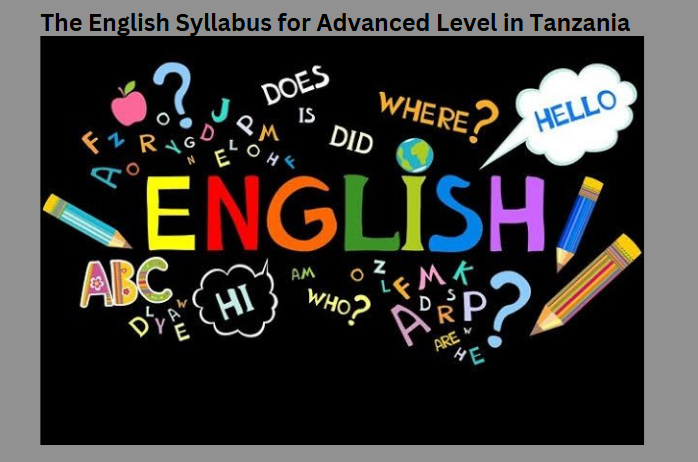The English Syllabus for Advanced Level in Tanzania; English is an essential subject in the Tanzanian education system, and its importance grows as students progress through their academic journey.
By the time students reach the advanced level (Form 5 and Form 6), their mastery of the English language plays a critical role in their overall academic performance and their preparation for university and future careers.
The English syllabus at the advanced level is designed to develop the students’ ability to use the language effectively in different contexts, including academic, professional, and social settings.
This blog post provides a detailed overview of the English syllabus for advanced level students in Tanzania, covering the key objectives, topics, and skills emphasized in the curriculum.

The Role of English in the Advanced Level
At the advanced level, English is no longer just about basic communication; it is about understanding and mastering the language in more complex and academic contexts. English is used as a medium of instruction in many other subjects, including science, history, geography, and the arts.
Therefore, students need to be proficient in reading, writing, listening, and speaking to succeed in their studies and beyond. The advanced level English syllabus is structured to help students achieve these skills and prepare them for the challenges of university education.
Objectives of the English Syllabus for Advanced Level
The English syllabus for advanced level students in Tanzania aims to:
- Enhance Language Proficiency: The primary goal is to help students achieve a high level of proficiency in English. By the end of the course, students should be able to use the language effectively in academic, professional, and social contexts.
- Improve Reading and Comprehension: Students are expected to read a wide range of texts, including novels, essays, poems, and plays. They should develop critical reading skills, be able to analyze texts, and respond to them thoughtfully.
- Develop Writing Skills: Writing is a key part of the syllabus, with an emphasis on crafting clear, coherent, and well-structured essays, reports, and other forms of written communication. Students also learn to write in different styles, such as argumentative, descriptive, and narrative writing.
- Strengthen Speaking and Listening Skills: Students need to be able to express their thoughts clearly and confidently in spoken English. The syllabus also focuses on listening skills, helping students understand spoken English in various contexts, such as lectures, discussions, and debates.
- Foster Critical Thinking and Analytical Skills: Students are encouraged to analyze and evaluate texts, arguments, and ideas critically. The syllabus aims to help students develop their ability to think critically, form their own opinions, and communicate them effectively.
Key Areas of Focus in the English Syllabus
The English syllabus for the advanced level is divided into several key areas, which are designed to develop students’ language skills progressively. Here are the main areas of focus:
1. Reading and Literature
In this area, students are introduced to a variety of literary texts, including novels, short stories, plays, and poetry. Reading is not just about understanding the content of a text, but also about analyzing the themes, characters, setting, and style of the author.
- Novels: Students read and analyze novels, paying attention to plot development, character analysis, and themes.
- Short Stories: Short stories are studied to understand narrative techniques and character development in a more condensed format.
- Plays: Students study plays, including works by famous playwrights such as William Shakespeare, analyzing dialogue, themes, and dramatic techniques.
- Poetry: Poetry is explored to understand rhythm, rhyme, metaphor, and other literary devices.
2. Writing Skills
Writing is a central aspect of the advanced level English syllabus. Students are taught how to write in various formats and styles, such as essays, reports, letters, and speeches. The focus is on clarity, coherence, and argumentation.
- Essay Writing: Students practice writing essays on various topics, with an emphasis on developing a clear argument, providing evidence, and organizing ideas logically.
- Reports and Letters: Students learn how to write formal reports and letters, which are essential for both academic and professional communication.
- Creative Writing: This includes writing stories, poems, and plays, encouraging students to use their imagination and creativity while still maintaining clarity and structure.
3. Grammar and Vocabulary
A strong understanding of grammar and vocabulary is essential for effective communication. The syllabus places a significant focus on reinforcing grammar rules and expanding vocabulary to help students use the language accurately and fluently.
- Grammar: Students review advanced grammar topics, such as tenses, passive voice, conditionals, and reported speech. The focus is on helping students use grammar correctly in both spoken and written forms.
- Vocabulary: Students learn new words and expressions, and how to use them appropriately in different contexts. Emphasis is placed on academic and formal vocabulary, which is necessary for writing essays, reports, and papers.
4. Speaking and Listening Skills
In the advanced level English syllabus, students are expected to engage in more complex speaking activities, such as debates, discussions, and presentations. They are also required to listen to spoken English in various forms, such as lectures, radio programs, and recorded materials.
- Debates and Discussions: Students participate in debates and discussions on current issues, using language that is persuasive and well-reasoned.
- Presentations: Students practice giving formal presentations on topics of their choice, focusing on clear communication, structure, and language.
- Listening Comprehension: Students listen to recordings or live discussions and answer questions based on the information they hear. This helps improve their ability to understand spoken English in different accents and contexts.
5. Language Use in Context
In addition to grammar and vocabulary, students are taught how to use English appropriately in different contexts. This includes understanding the tone, formality, and style required in various communication settings.
- Formal and Informal English: Students learn the difference between formal and informal English and practice using the appropriate form depending on the context. For example, they learn how to write formal letters for academic or professional purposes, while also understanding how to communicate casually in everyday situations.
- Academic Writing: Students are taught how to write academic papers, including research papers and essays, with a focus on structure, citation, and argumentation.
Assessment in English at the Advanced Level
The assessment of English at the advanced level involves both continuous assessment (such as assignments and class participation) and final exams. The exams test students’ proficiency in the four main skills: reading, writing, speaking, and listening.
- Reading Comprehension: Students are given passages to read and are asked questions that test their understanding, interpretation, and critical analysis of the text.
- Essay Writing: Students are required to write essays on various topics, demonstrating their ability to organize ideas, present arguments, and use appropriate language.
- Speaking: Students may be assessed through oral exams, where they are asked to present on a given topic or engage in a discussion.
- Listening: Listening exams test students’ ability to understand spoken English and respond appropriately.
Benefits of Learning English at the Advanced Level
- University Admission: Proficiency in English is crucial for gaining admission to universities, as most university courses are taught in English. A strong command of the language ensures students can succeed in higher education.
- Improved Communication Skills: Learning English at the advanced level enhances students’ ability to communicate effectively, whether in academic, professional, or social situations.
- Career Opportunities: English is the global language of business, and proficiency in English opens up numerous career opportunities both in Tanzania and abroad.
- Cultural Awareness: Studying English literature exposes students to diverse cultures, ideas, and perspectives, broadening their understanding of the world.
Conclusion
The English syllabus for advanced level students in Tanzania is designed to help students develop a high level of proficiency in the language. By focusing on reading, writing, speaking, and listening, students are prepared for the demands of university education and future careers.
A strong command of English not only opens doors to academic success but also equips students with the communication skills needed to thrive in the global world.
Related articles
- Science Subject in the Tanzanian Syllabus: Building Foundations for Innovation
- Science Subject in Tanzania: An Overview
- Mathematics Syllabus for Primary School in Tanzania-elimuhuru
- History of Mathematics in Tanzania-elimuhuru
- Top 10 Best Private Secondary Schools in Tanzania-Elimuhuru
- Top 50 Best Secondary Schools in Tanzania-Elimuhuru
- Education system in tanzania 2024-Elimuhuru
- Tanzania Education Statistics-Elimuhuru
- Scholarships in Tanzanian Universities-Elimuhuru
- Tanzania school fees: A Guide for Parents and Students
- International School of Tanganyika Fees-Elimuhuru
- Ahmes Secondary School Fees-Elimuhuru


